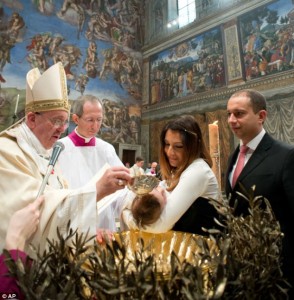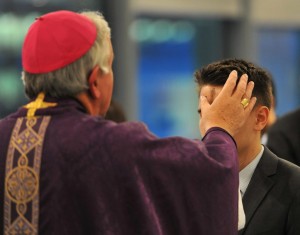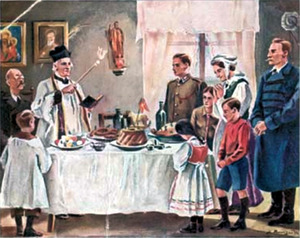Fasting is one of those aspects of the Christian life that is not well-received these days. Chrysostom teaches that “we fast to offer our entire selves to the dedication of spiritual thing.” On the medical level, fasting is a purifying practice for the body. Analogously, fasting is purifying for the soul. Eating too much does not open the soul as wide as possible to be in communio with the Lord because it makes the body sluggish, tired and distracted. The point of fasting is awaken our whole being. You can see how the author of the homily below takes a more wholesome approach to this practice taking to heart what the Prophets Joel teaches, rend your hearts. The point of fasting is not merely doing without food for no particular good reason but it does open the heart, at the level of the conscience, to a new way of being: a full life in Christ Jesus. I hope it opens a dialogue for you. Here is an abridged homily St. John Chrysostom.
Fasting is a medicine. But medicine, as beneficial as it is, becomes useless because of the inexperience of the user. He has to know the appropriate time that the medicine should be taken and the right amount of medicine and the condition of the body which is to take it, the weather conditions and the season of the year and the appropriate diet of the sick and many other things. If any of these things are overlooked, the medicine will do more harm than good. So, if one who is going to heal the body needs so much accuracy, when we care for the soul and are concerned about healing it from bad thoughts, it is necessary to examine and observe everything with every possible detail.
Fasting is the change of every part of our life, because the sacrifice of the fast is not the abstinence but the distancing from sins. Therefore, whoever limits the fast to the deprivation of food, he is the one who, in reality, abhors and ridicules the fast. Are you fasting? Show me your fast with your works. Which works? If you see someone who is poor, show him mercy. If you see an enemy, reconcile with him. If you see a friend who is becoming successful, do not be jealous of him! If you see a beautiful woman on the street, pass her by.
In other words, not only should the mouth fast, but the eyes and the legs and the arms and all the other parts of the body should fast as well. Let the hands fast, remaining clean from stealing and greediness. Let the legs fast, avoiding roads which lead to sinful sights. Let the eyes fast by not fixing themselves on beautiful faces and by not observing the beauty of others. You are not eating meat, are you? You should not eat debauchery with your eyes as well. Let your hearing also fast. The fast of hearing is not to accept bad talk against others and sly defamations.
Let the mouth fast from disgraceful and abusive words, because, what gain is there when, on the one hand we avoid eating chicken and fish and, on the other, we chew-up and consume our brothers? He who condemns and blasphemes is as if he has eaten brotherly meat, as if he has bitten into the flesh of his fellow man. It is because of this that Paul frightened us, saying: “If you chew up and consume one another be careful that you do not annihilate yourselves.”
You did not thrust your teeth into the flesh (of your neighbor) but you thrusted bad talk in his soul; you wounded it by spreading disfame, causing unestimatable damage both to yourself, to him, and to many others.
If you cannot go without eating all day because of an ailment of the body, beloved one, no logical man will be able to criticize you for that. Besides, we have a Lord who is meek and loving (philanthropic) and who does not ask for anything beyond our power. Because he neither requires the abstinence from foods, neither that the fast take place for the simple sake of fasting, neither is its aim that we remain with empty stomachs, but that we fast to offer our entire selves to the dedication of spiritual things, having distanced ourselves from secular things. If we regulated our life with a sober mind and directed all of our interest toward spiritual things, and if we ate as much as we needed to satisfy our necessary needs and offered our entire lives to good works, we would not have any need of the help rendered by the fast. But because human nature is indifferent and gives itself over mostly to comforts and gratifications, for this reason the philanthropic Lord, like a loving and caring father, devised the therapy of the fast for us, so that our gratifications would be completely stopped and that our worldly cares be transferred to spiritual works. So, if there are some who have gathered here and who are hindered by somatic ailments and cannot remain without food, I advise them to nullify the somatic ailment and not to deprive themselves from this spiritual teaching, but to care for it even more.
For there exist, there really exist, ways which are even more important than abstinence from food which can open the gates which lead to God with boldness. He, therefore, who eats and cannot fast, let him display richer almsgiving, let him pray more, let him have a more intense desire to hear divine words. In this, our somatic illness is not a hindrance. Let him become reconciled with his enemies, let him distance from his soul every resentment. If he wants to accomplish these things, then he has done the true fast, which is what the Lord asks of us more than anything else. It is for this reason that he asks us to abstain from food, in order to place the flesh in subjection to the fulfillment of his commandments, whereby curbing its impetuousness. But if we are not about to offer to ourselves the help rendered by the fast because of bodily illness and at the same time display greater indifference, we will see ourselves in an unusual exaggerated way. For if the fast does not help us when all the aforementioned accomplishments are missing so much is the case when we display greater indifference because we cannot even use the medicine of fasting. Since you have learned these things from us, I pardon you, those who can, fast and you yourselves increase your acuteness and praiseworthy desire as much as possible.
To the brothers, though, who cannot fast because of bodily illness, encourage them not to abandon this spiritual word, teaching them and passing on to them all the things we say here, showing them that he who eats and drinks with moderation is not unworthy to hear these things but he who is indifferent and slack. You should tell them the bold and daring saying that “he who eats for the glory of the Lord eats and he who does not eat for the glory of the Lord does not eat and pleases God.” For he who fasts pleases God because he has the strength to endure the fatigue of the fast and he that eats also pleases God because nothing of this sort can harm the salvation of his soul, as long as he does not want it to. Because our philanthropic God showed us so many ways by which we can, if we desire, take part in God’s power that it is impossible to mention them all.
We have said enough about those who are missing, being that we want to eliminate them from the excuse of shame. For they should not be ashamed because food does not bring on shame but the act of some wrongdoing. Sin is a great shame. If we commit it not only should we feel ashamed but we should cover ourselves exactly the same way those who are wounded do. Even then we should not forsake ourselves but rush to confession and thanksgiving. We have such a Lord who asks nothing of us but to confess our sins, after the commitment of a sin which was due to our indifference, and to stop at that point and not to fall into the same one again. If we eat with moderation we should never be ashamed, because the Creator gave us such a body which cannot be supported in any other way except by receiving food. Let us only stop excessive food because that attributes a great deal to the health and well-being of the body.
Let us therefore in every way cast off every destructive madness so that we may gain the goods which have been promised to us in the name of our Lord Jesus Christ and the Father and the Holy Spirit. Amen.





